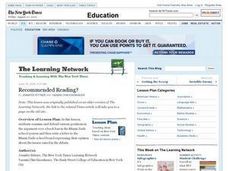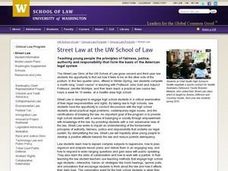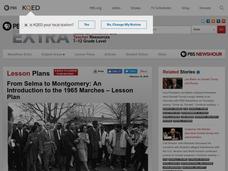Curated OER
The Bill of Rights: Debating the Amendments
Students explore the Bill of Rights. In this U.S. Constitution lesson, students participate in classroom debate regarding the first 10 amendments to the Constitution. Students then vote for the amendments they would like to ratify.
Curated OER
Recommended Reading?
Students examine and defend various positions in the argument over a book ban in the Miami-Dade school system and then write a letter to the Miami-Dade school board expressing their opinion about the issues raised in the debate.
Curated OER
Individual Rights and Liberties: Free Speech
Learners review free speech laws and the First Amendment in the Constitution. They discuss a current event involving free speech. They present the information to the class.
Benjamin Franklin Tercentenary
Franklin’s Fair Hand American Journalism
Scholars know him for his role in the American Revolution, but Ben Franklin was also a journalist and printer. Learners investigate his standards for what was fit to print using primary sources—including writings where Franklin explains...
Annenberg Foundation
Controversial Issues in Practice
Wow! This resource provides three related lessons on the First Amendment that challenge US government students to explore their personal opinion on the separation of church and state. Each lesson can be adjusted in length, but is...
Curated OER
The Ongoing Debate: Crime Control v. Due Process Protection
Students investigate the Exclusionary Rule and other ways of to enforce the protections found in the Bill of Rights. They study how effective criminal control and public safety is carried out while citizens Constitutional rights are...
Curated OER
Public Demonstrations - Lesson Plan
Students examine various handouts to determine the value, necessity and potential limitations of assembly and public demonstrations. They then select a side and debate pre-provided questions.
National Endowment for the Humanities
The Creation of the Bill of Rights: “Retouching the Canvas”
While the Constitutional Convention lay the foundation of the new government for the United States, the protections given under the Bill of Rights were controversial. Using documents, such as James Madison's and Thomas Jefferson's...
Administrative Office of the US Courts
Snyder v. Phelps
Does the Westboro Baptist Church have the protection of the Constitution when protesting military funerals? High schoolers examine the 2011 Supreme Court case of Snyder v. Phelps before comparing the situation to a fictional scenario of...
Curated OER
Students Press Law and Ethics
Students research the rights and the responsibilities of journalists in dealing with First Amendment issues. In this First Amendment lesson plan, students research the Alien and Sedition Acts and study the five elements of libel....
Curated OER
The Holocaust's Legacy
Learners investigate contemporary hate groups and then participate in a debate on tolerating their existence of the Holocaust. They work in groups to conduct research. Students use print and Web resources to identify one or more...
National Constitution Center
Born in the U.S.A: Music as Political Protest
Though often used in shows of patriotism, Bruce Springsteen's 1985 song "Born in the U.S.A." is critical of America's role in the Vietnam war and its treatment of American veterans. High schoolers analyze the song's lyrics in an activity...
PBS
Women's History: Parading Through History
Want to teach your pupils about debate, effective speech techniques, propaganda, and the women's movement? The first in a sequential series of three, scholars analyze real propaganda images from the the historic women's movement, view a...
Curated OER
John Gary Evans and the Politics of Race
Young scholars read letters written by Evans and Gunton regarding race relations. In this Progressive Movement lesson, students interpret the intentions and tone of the letters to understand contemporary racial beliefs. Young scholars...
PBS
From Selma to Montgomery: An Introduction to the 1965 Marches
The 1965 Civil Rights marches from Selma to Montgomery and the resulting Voting Rights Act of 1965 are the focus of a social studies lesson. The resource uses film clips to inform viewers not only about the discrimination that gave rise...
Curated OER
Introduction to Law I
Students identify four basic values (economic, social, moral, and political) protected by law, examine different definitions of values, and correlate laws to values they aim to protect.
Heritage Foundation
Slavery and the Constitution
It's hard to believe the abolition movement was once seen as scandalous. Help learners understand how the US Constitution changed everything. A variety of activities such as corresponding reading activities, group work ideas, and...
Curated OER
Our Classroom Constitution
Develop a system of classroom rules created by the kids, for the kids with this three-part lesson series on the US Constitution. After learning about the structure of the Constitution and the government it established, young scholars...
Curated OER
Balancing Budgets: From Reagan to Today
Students discover details about the federal budget. In this contemporary government lesson, students research the efforts to maintain a balanced federal budget in the United States since the 1980's. Students then participate in a debate...
Curated OER
Rome: Republic to Empire
Sixth graders discuss the rise of Rome from a republic to a dictatorship. In small groups, they role-play as congress people debating whether or not to give the president more powers. In another activity, 6th graders produce television...
Curated OER
Tally of the 1824 Electoral College Vote
Twelfth graders study the parts of the Constitution that address presidential election. They complete a variety of activities designed to spark debate about the flaws in the Electoral College system.
Curated OER
Government: War Powers Limitations
Students examine historic examples of authority during wartime. They interpret the Fifth Amendment. They debate the merits of the Patriot Act.
C-SPAN
Presidential Birth Requirement
Every president of the United States must be a natural-born citizen, but the definition of natural-born is not as straightforward as it seems. Secondary scholars examine two points of view surrounding the constitutional requirement and...
University of California
The Civil War: Emancipation
Investigate and analyze Abraham Lincoln's Emancipation Proclamation using primary and secondary sources. The sixth installment of an eight-part series analyzes the meaning of Lincoln's document in relation to its impact on the Civil War.

























